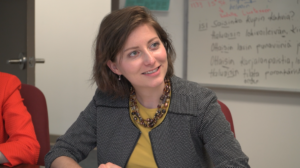5 Ways to Overcome the Language Learning Plateau

Stuck getting to the next proficiency level? Today, we are going to provide 5 ways to overcome a language “plateau”. If you missed the article about what the plateau is, make sure you first check it out.
Needless to say, overcoming a plateau requires a huge amount of effort and time. Some students never achieve an advanced level of the language. If you are ready for a challenge and haven’t been discouraged by the introduction, keep reading. You can find dozens of online articles as well as publications which offer different theories of methodology on this topic. One of the most common tips is to immerse yourself in the language 24/7. However, you don’t need to move to the target country (yet) to achieve an advanced level.
Here are my tips – remember, I was in your shoes too, and I was able to reach an advanced level of English before I moved to the US.
- Fluency and flawlessness
To sound like a native requires a certain level of fluency and flawlessness. In a short, your textbook is comprehensive but in a way limited. It can’t provide the immediate setting of a foreign language environment where you need to react immediately with a correct language register. You need to put yourself in real life situations outside of the classroom. You teacher might know a local community that you can connect with or you can find a conversation partner. Luckily, in this area, (DC) language meetup groups take place almost every week and you can interact with not only learners like you, but also native speakers.
- Self-correction
Fossilized errors are hard to fix. From a teacher’s perspective, it is essential that you start to notice your mistakes and correct yourself. Record yourself speaking on a certain topic and submit your recording to your teacher. Go through the mistakes with your teacher. After that, you can rerecord the topic and make sure that you omit those mistakes. Also, encourage your new language friend to correct you while you speak.
- Watch TV shows
Watching TV shows provides a great opportunity to see how people naturally speak. Unlike the television news, TV shows provide you with the uncensored language from different settings – hospitals, police departments, schools, households, etc. I encourage you to add subtitles and read the script with the sound. If you can’t find a series that you like in the target language, look for it on YouTube since in many countries American series are dabbed and often uploaded online.
- Embrace and use language chunks
Have you seen the movie called Operator? It tells a story of an IT system engineer who recruits his wife to be the automated voice machine. He starts to fall in love with the voice robot (yes, his wife’s voice), and this is the reason why the couple breaks up. After she leaves him, he uses recordings of her voice he had got from her. By connecting different language phrases he gets answers to almost everything he tells his new automated wife. No, this is not a manual to record your teacher and make a language voice machine to answer questions instead of you. The point is, that our language oral production consists of language chunks, phrases, that can be used in any environment. Have you caught yourself saying the same phrases in English in any topic? From easy ones as Pretty good, how are you doing, I know what you mean, to it all depends on, I hear you! all over the world, You can pick up these language chunks from TV shows, your language friends and your teacher too. The language chunks will ease your speaking and will enhance the fluency.
5. Take a private one-on-one class
Private language classes allow you to focus on specific weaknesses that will allow you to push through the plateau. Often times in group language classes, you are not able to work on the specific skills that you want to sharpen. With private instruction, you and a native speaking instructor can make much faster progress on topics relevant to advanced language learners. Whether online at the convenience of your home or in a classroom, private instruction can be a great tool to use to push through plateaus.
Author: Eliska Prushankin

Eliska has been teaching Slovak and Czech at ICLS for almost a year. Growing up in a family full of teachers, she fell in love with teaching at an early age. Teaching languages allows her to connect with people from different countries, something that she treasures.


